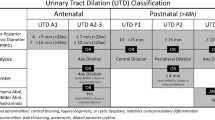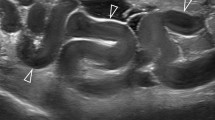Abstract
CT urography has emerged as a serious alternative to conventional urography by utilizing the advantages of modern multislice CT techniques for the visualization of the entire upper urinary tract. Several different examination techniques have been developed in multislice CT (MSCT) urography for improving the opacification and distension of the urinary tract. All efforts in performing MSCT urography have to compromise between the best possible image quality and a reasonably low radiation exposure. Initial low-dose examination protocols are already available. Operating modern MSCT urography properly is not difficult, but it presupposes basic knowledge on the variety of current MSCT urography techniques, including such issues as present-day indications, split-bolus injection, compression, saline infusion, low-dose diuretic administration, hybrid scanning, timing of the acquisition delay, examination protocols, postprocessing, image analysis, and radiation exposure. This article is not intended to provide guidelines of how to conduct MSCT urography, but everyone will be able to understand the functionality of several robust operating MSCT urography techniques, which helps making an individual selection for the clinical practice. In the near future, systematic studies are awaited evaluating the morphologic and diagnostic accuracy of MSCT urography regarding diverse urinary tract disorders.









Similar content being viewed by others
References
Swick M (1929) Darstellung der Nieren und Harnwege im Röntgenbild durch intravenöse Einbringung eines neuen Kontraststoffes des Uroselectans. Klin Wochenschr 8:2087–2089
Perlman ES, Rosenfield AT, Wexler JS, Glickman MG (1996) CT urography in the evaluation of urinary tract disease. J Comput Assist Tomogr 20:620–626
McNicholas MMJ Raptopoulos VD, Schwartz RK, Sheiman RG, Zormpala A, Prassopoulos PK, Ernst RD, Pearlman J (1998) Excretory phase CT urography for opacification of the urinary collecting system. AJR 170:1261–1267
Heneghan JP, Kim DH, Leder RA, DeLong D, Nelson RC (2001) Compression CT urography: a comparison with IVU in the opacification of the collecting system and ureters. J Comput Assist Tomogr 25:343–347
Nolte-Ernsting CCA, Wildberger JE, Borchers H, Schmitz-Rode T, Günther RW (2001) Multi-slice CT urography after diuretic injection: initial results. Fortschr Röntgenstr 173:176–180
Chow LC, Sommer FG (2001) Multidetector CT urography with abdominal compression and three-dimensional reconstruction. AJR 177:849–855
Caoili EM, Cohan RH, Korobkin M, Platt JF, Francis IR, Faerber GJ, Montie JE, Ellis JH (2002) Urinary tract abnormalities: initial experience with multi-detector row CT urography. Radiology 222:353–360
McCarthy CL, Cowan NC (2002) Multidetector CT urography (MDCTU) for urothelial imaging. Radiology 225 Suppl:237
McTavish JD, Jinzaki M, Zou KH, Nawfel RD, Silverman SG (2002) Multi-detector row CT urography: comparison of strategies for depicting the normal urinary collecting system. Radiology 225:783–790
Smith RC, Verga M, McCarthy S, Rosenfield AT (1996) Diagnosis of acute flank pain: value of unenhanced helical CT. AJR 166:97–101
Dalla Palma L, Pozzi-Mucelli R, Stacul F (2001) Present-day imaging of patients with renal colic. Eur Radiol 11:4–17
Wang LJ, Ng CJ, Chen JC, Chiu TF, Wong YC (2004) Diagnosis of acute flank pain caused by ureteral stones: value of combined direct and indirect signs on IVU and unenhanced helical CT. Eur Radiol 14:1634–1640
Warshauer DM, McCarthy SM, Street L, Bookbinder MJ, Glickman MG, Richter J, Hamers J, Taylor C, Rosenfield AT (1988) Detection of renal masses: sensitivities and specificities of excretory urography/lienar tomography, US, and CT. Radiology 169:363–365
Schreyer HH, Uggowitzer MM, Ruppert-Kohlmayr A (2002) Helical CT of the urinary organs. Eur Radiol 12:575–591
Girish G, Agarwal SK, Salim F, Brown PWG, Morcos SK (2003) Single-phase multislice CT urography: initial experience. Eur Radiol 13(Suppl 1):147
Kim JK, Par SY, Kim HJ, Kim CS, Ahn HJ, Ahn TY, Cho KS (2003) Living donor kidneys: usefulness of multi-detector row CT for comprehensive evaluation. Radiology 229:869–876
Joffe SA, Servaes S, Okon S, Horowitz M (2003) Mulit-detector row CT urography in the evaluation of hematuria. Radiographics 23:1441–1456
Kawamoto S, Horton KM, Fishman EK (2004) Computed tomography urography with 16-channel multidetector computed tomography: a pictoral review. J Comput Assist Tomogr 28:581–587
Caoili EM, Inampudi P, Cohan RH, Ellis JH (2005) Optimization of multi-detector row CT urography: effect of compression, saline administration, and prolongation of acquisition delay. Radiology 235:116–123
Caoili EM, Cohan RH, Inampudi P, Ellis JH, Shah RB, Faerber GJ, Montie JE (2005) MDCT urography of upper tract urothelial neoplasms. AJR 184:1873–1881
Kemper J, Adam G, Nolte-Ernsting C (2005) Multislice CT urography: aspects for technical management and clinical application. Radiologe 45:905–914
Noroozian M, Cohan RH, Caoili EM, Cowan NC, Ellis J (2004) Multislice CT urography: state of the art. Br J Radiol 77:S74–S86
Warakaulle DR, Cowan NC (2004) Multi-detector CT urography: image quality analysis of a 2-series, double-bolus technique. Radiology 233 (Suppl S):386
Cowan NC (2005) Multislice CT of urothelial tumors. Eur Radiol 15(Suppl 1):97
Maher MM, Jhaveri KS, Lucey BC, Sahani DV, Saini S, Mueller PR (2001) Does the administration of saline flush during CT urography (CTU) improve ureteric distension and opacification? A prospective study. Radiology 221 Suppl:500
Maher MM, Kaira MK, Rizzo S, Mueller PR, Saini S (2004) Multidetector CT urography in imaging of the urinary tract in patients with hematuria. Korean J Radiol 5:1–10
Sudakoff GS, Guralnick M, Langenstroer P, Foley DW, Cihlar KL, Shakespear JS, See WA (2005) CT urography of urinary diversions with enhanced CT digital radiography: preliminary experience. AJR 184:131–138
Sudakoff GS, Dunn DP, Hellman RS, Laguna MA, Wilson CR, Prost RW, Eastwood DC, Lim HJ (2006) Opacification of the genitourinary collecting system during MDCT urography with enhanced CT digital radiography: nonsaline versus saline bolus. AJR 186:122–129
Nawfel RD, Judy PF, Schleipman AR, Silverman SG (2004) Patient radiation dose at CT urography and conventional urography. Radiology 232:126–132
Kawashima A, Vrtiska TJ, LeRoy AJ, Hartman RP, McCollough CH, King BF Jr (2004) CT urography. Radiographics 24:S35–S58
McCollough CH, Bruesewitz MR, Vrtiska TJ, King BF, LeRoy AJ, Quam JP, Hattery RR (2001) Image quality and dose comparison among screen-film, computed, and CT scanned projection radiography: applications to CT urography. Radiology 221:395–403
Caoili EM, Cohan RH, Korobkin M, Platt JF, Francis IR, Gebremariam A, Ellis JH (2001) Effectiveness of abdominal compression during helical renal CT. Acad Radiol 8:1100–1106
Kemper J, Regier M, Begemann PGC, Stork A, Adam G, Nolte-Ernsting C (2005) Multislice computed tomography-urography: intraindividual comparison of different preparation techniques for optimized depiction of the upper urinary tract in an animal model. Invest Radiol 40:126–133
Huang J, Kim YH, Shankar S, Tyagi G, Baker SP (2006) Multislice CT urography: comparison of two different scanning protocols for improved visualization of the urinary tract. J Comput Assist Tomogr 30:33–36
Raptopoulos V, McNamara A (2005) Improved pelvicalyceal visualization with multidetector computed tomography urography; comparison with helical computed tomography. Eur Radiol 15:1834–1840
Nolte-Ernsting CCA, Bucker A, Adam GB, Neuerburg JM, Jung P, Hunter DW, Jakse G, Günther RW (1998) Gadolinium-enhanced excretory MR urography after low-dose diuretic injection: comparison with conventional excretory urography. Radiology 209:147–157
Verswijvel GA, Oyen RH, Van Poppel HP, Goethuys H, Maes B, Vaninbrouckx J, Bosmans H, Marchal G (2000) Magnetic resonance imaging in the assessment of urologic disease: an all-in-one approach. Eur Radiol 10:1614–1619
Staatz G, Nolte-Ernsting CCA, Adam GB, Hübner D, Rohrmann D, Stollbrink C, Günther RW (2000) Feasibility and utility of respiratory-gated, gadolinium-enhanced T1-weighted magnetic resonance urography in children. Invest Radiol 35:504–512
Sudah M, Vanninen R, Partanen K, Heino A, Vainio P, Ala-Opas M (2001) MR urography in evaluation of acute flank pain: T2-weighted sequences and gadolinium-enhanced three-dimensional FLASH compared with urography. Fast low-angle shot. AJR Am J Roentgenol 176:105–112
Blandino A, Gaeta M, Minutoli F, Salamone I, Magno C, Scribano E, Pandolfo I (2002) MR urography of the ureter. AJR Am J Roentgenol 179:1307–1314
El-Diasty T, Mansour O, Farouk A (2003) Diuretic contrast-enhanced magnetic resonance urography versus intravenous urography for depiction of nondilated urinary tracts. Abdom Imaging 28:135–145
Jackson EK (1996) Diuretics. In: Hardman JG, Limbird LE, Molinoff PB, Ruddon RW, Goodman Gilman A (eds) Goodman & Gilman’s The pharmacological basis of therapeutics, 9th edn. McGraw-Hill, New York, pp 691,692,697–701
Kemper J, Regier M, Stork A, Adam G, Nolte-Ernsting C (2006) Multislice-CT-urography: evaluation of a modified scan protocol for optimized opacification of the collecting system. Fortschr Röntgenstr 178:531–537
Wall BF, Hart D (1997) Revised radiation doses for typical X-ray examinations. Report on a recent review of doses to patients from medical X-ray examinations in the UK by NRPB. Br J Radiol 70:437–439
Kemper J, Begemann PGC, Regier M, Stork A, Adam G, Nolte-Ernsting C (2005) Multislice-CT-urography (MSCTU): experimental evaluation of low-dose protocols. Eur Radiol 15(Suppl 1):273
Stamm G, Nagel HD (2002) CT-expo-a novel program for dose evaluation in CT. Fortschr Röntgenstr 174:1570–1576
Nagel HD, Blobel J, Brix G, Ewen K, Galanski M, Höfs P, Loose R, Prokop M, Schneider K, Stamm G, Stender HS, Süss C, Türkay S, Vogel H, Wucherer M (2004) Five years of “concerted action dose reduction in CT”-What has been achieved and what remains to be done? Fortschr Röntgenstr 176:1683–1694
Kalra MK, Maher MM, Rizzo S, Saini S (2004) Radiation exposure and projected risks with multidetector-row computed tomography scanning: clinical strategies and technologic developments for dose reduction. J Comput Assist Tomogr 28:S46–S49
Greess H, Wolf H, Baum U, Lell M, Pirkl M, Kalender W, Bautz WA (2000) Dose reduction in computed tomography by attenuation-based on-line modulation of tube current: evaluation of six anatomical regions. Eur Radiol 10:391–394
Mueller-Lisse UG, Mueller-Lisse UL, Hinterberger J, Schneede P, Reiser MF (2003) Tri-phasic MDCT in the diagnosis of urothelial cancer. Eur Radiol 13(Suppl 1):146–147
Abo El-Ghar ME, Shokeir AA, El-Diasty TA, Refaie HF, Gad HM, Shehab El-Dein AB (2004) Contrast enhanced spiral computerized tomography in patients with chronic obstructive uropathy and normal serum creatinine: a single session for anatomical and functional assessment. J Urol 172:985–988
Morcos SK, Thomsen HS, Webb JA (1999) Contrast-media-induced nephrotoxicity: a consensus report. Contrast Media Safety Committee, European Society of Urogenital Radiology (ESUR). Eur Radiol 9:1602–1613
Tack D, Sourtzis S, Delpierre I, de Maertelaer V, Gevenois PA (2003) Low-dose unenhanced multidetector CT of patients with suspected renal colic. AJR 180:305–311
Kluner C, Hein PA, Gralla O, Hein E, Hamm B, Romano V, Rogalla P (2006) Does ultra-low-dose CT with a radiation dose equivalent to that of KUB suffice to detect renal and ureteral calculi? J Comput Assist Tomogr 30:44–50
Hamm M, Knöpfle E, Wartenberg S, Wawroschek F, Weckermann D, Harzmann R (2002) Low dose unenhanced helical computerized tomography for the evaluation of acute flank pain. J Urol 167:1687–1691
Author information
Authors and Affiliations
Corresponding author
Rights and permissions
About this article
Cite this article
Nolte-Ernsting, C., Cowan, N. Understanding multislice CT urography techniques: many roads lead to Rome. Eur Radiol 16, 2670–2686 (2006). https://doi.org/10.1007/s00330-006-0386-z
Received:
Revised:
Accepted:
Published:
Issue Date:
DOI: https://doi.org/10.1007/s00330-006-0386-z




